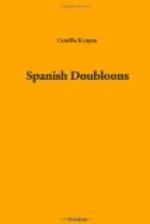The old man died in the house of a niece, to whom by way of legacy he left his map. For the satisfaction of his anxious mind, still poring on the treasure, she wrote down what she could grasp of his instructions, and then, being an unimaginative woman, gave the matter little further heed. For years the map lay among other papers in a drawer, and here it was at length discovered by her son, himself a sailor. He learned from her its history, and having been in the Pacific, and heard the tales and rumors that cling about Leeward Island like the everlasting surf of its encompassing seas, this grand-nephew of old Hopperdown’s, by name David Jenkins, became for the rest of his days a follower of the ignis fatuus. An untaught, suspicious, grasping man, he rejected, or knew not how to set about, the one course which offered the least hope, which was to trade his secret for the means of profiting by it. AH his restless, hungry life he spent in wandering up and down the seas, ever on the watch for some dimly imagined chance by which he might come at the treasure. And so at last he wandered into the London hospital where he died.
And to me the wildest feature of the whole wild tale was that at the last he should have parted with the cherished secret of a lifetime to Miss Higglesby-Browne.
In a general way, every one of us knew this history. Even I had had an outline of it from Cuthbert Vane. But so far nobody had seen the map. And now we were to see it; the time that intervened before that great event had already dwindled to minutes, to seconds—
But no; for Miss Browne arose and began to make a speech. The beginning of it dealt in a large and generalizing manner with comradeship and loyalty, and the necessity of the proper mental attitude in approaching the business we had in hand. I did not listen closely. The truth is, I wanted to see that map. Under the spell of the island, I had almost begun to believe in the chest of doubloons.
Suddenly I awoke with a start to the fact that Miss Browne was talking about me. Yes, I, indubitably, was the Young Person whose motives in attaching herself to the party were so at variance with the amity and mutual confidence which filled all other breasts. It was I who had sought to deprive the party of the presence, counsel and support of a member lacking whom it would have been but a body without a soul. It was I who had uttered words which were painful and astounding to one conscious of unimpugnable motives. In the days of toil to come, we were reminded, the Young Person, to wit, myself, would have no share. She would be but skeptic, critic, drone in the busy hive. Thus it was obvious that the Young Person could not with any trace of justice claim part or lot in the treasure. Were it not well, then, that the Young Person be required to make formal and written renunciation of all interest in the golden hoard soon to reward the faith and enterprise of the Harding-Browne expedition? Miss Browne requested the sense of the meeting on the matter.




